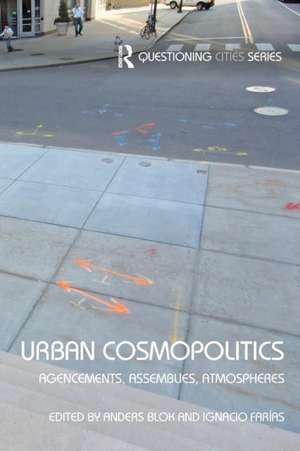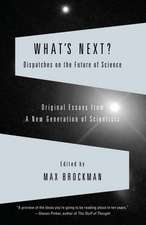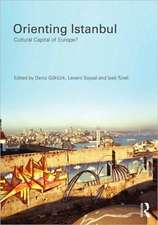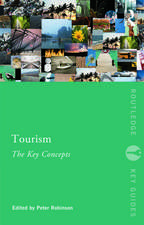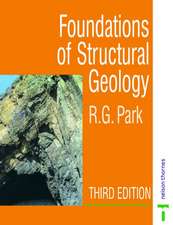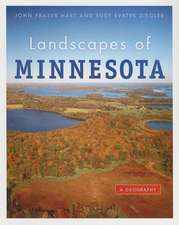Urban Cosmopolitics: Agencements, assemblies, atmospheres: Questioning Cities
Editat de Anders Blok, Ignacio Fariasen Limba Engleză Paperback – 21 ian 2016
Focusing on changing sanitation infrastructures and practices, emerging forms of urban activism, processes of economic restructuring, transformations of the built environment, changing politics of expert-based urban planning, as well as novel practices for navigating the urban everyday, the contributions gathered in this volume explore different conceptual and empirical configurations of urban cosmopolitics: agencements, assemblies, atmospheres. Taken together, the volume thus aims at introducing and specifying a novel research program for rethinking urban studies and politics, in ways that remain sensitive to the multiple agencies, materialities, concerns and publics that constitute any urban situation.
| Toate formatele și edițiile | Preț | Express |
|---|---|---|
| Paperback (1) | 486.38 lei 6-8 săpt. | |
| Taylor & Francis – 21 ian 2016 | 486.38 lei 6-8 săpt. | |
| Hardback (1) | 1002.68 lei 6-8 săpt. | |
| Taylor & Francis – 21 ian 2016 | 1002.68 lei 6-8 săpt. |
Din seria Questioning Cities
- 25%
 Preț: 218.03 lei
Preț: 218.03 lei - 15%
 Preț: 539.88 lei
Preț: 539.88 lei - 25%
 Preț: 297.57 lei
Preț: 297.57 lei -
 Preț: 295.59 lei
Preț: 295.59 lei -
 Preț: 407.01 lei
Preț: 407.01 lei -
 Preț: 445.31 lei
Preț: 445.31 lei -
 Preț: 445.47 lei
Preț: 445.47 lei - 25%
 Preț: 312.57 lei
Preț: 312.57 lei -
 Preț: 277.17 lei
Preț: 277.17 lei -
 Preț: 369.37 lei
Preț: 369.37 lei -
 Preț: 414.32 lei
Preț: 414.32 lei -
 Preț: 494.66 lei
Preț: 494.66 lei -
 Preț: 416.22 lei
Preț: 416.22 lei -
 Preț: 497.63 lei
Preț: 497.63 lei -
 Preț: 407.57 lei
Preț: 407.57 lei -
 Preț: 369.61 lei
Preț: 369.61 lei - 17%
 Preț: 269.39 lei
Preț: 269.39 lei
Preț: 486.38 lei
Nou
Puncte Express: 730
Preț estimativ în valută:
93.09€ • 100.49$ • 78.06£
93.09€ • 100.49$ • 78.06£
Carte tipărită la comandă
Livrare economică 19 aprilie-03 mai
Preluare comenzi: 021 569.72.76
Specificații
ISBN-13: 9781138813410
ISBN-10: 1138813419
Pagini: 266
Ilustrații: 13 black & white illustrations, 12 black & white halftones, 1 black & white line drawings
Dimensiuni: 156 x 234 x 15 mm
Greutate: 0.39 kg
Ediția:1
Editura: Taylor & Francis
Colecția Routledge
Seria Questioning Cities
Locul publicării:Oxford, United Kingdom
ISBN-10: 1138813419
Pagini: 266
Ilustrații: 13 black & white illustrations, 12 black & white halftones, 1 black & white line drawings
Dimensiuni: 156 x 234 x 15 mm
Greutate: 0.39 kg
Ediția:1
Editura: Taylor & Francis
Colecția Routledge
Seria Questioning Cities
Locul publicării:Oxford, United Kingdom
Public țintă
PostgraduateNotă biografică
Anders Blok is Associate Professor in the Department of Sociology, University of Copenhagen, Denmark, and co-author of Bruno Latour: Hybrid Thoughts in a Hybrid World (Routledge, 2011).
Ignacio Farías is Assistant Professor in the Munich Center for Technology in Society and the Faculty of Architecture at the Technische Universität, München, Germany. He is co-editor of Urban Assemblages: How Actor-Network Changes Urban Studies (Routledge, 2009).
Ignacio Farías is Assistant Professor in the Munich Center for Technology in Society and the Faculty of Architecture at the Technische Universität, München, Germany. He is co-editor of Urban Assemblages: How Actor-Network Changes Urban Studies (Routledge, 2009).
Recenzii
Urban Cosmopolitics offers a new way of thinking and doing urban politics. This theoretically bold and empirically rich collection shows that urban infrastructures and technologies are so much more than the supporting context for urban society and politics, they animate social life and activate political interest.Urban Cosmopoliticsshowcases the relevance of pragmatist and actor-network inspired approaches to understanding the most complex, multivariate, spatially extensive of socio-material assemblages – the city. It is a collection of essays that offers novel concepts for understanding the effects of urban technologies and expertise, as well as templates for alternative visions for assembling and enacting urban worlds.
Jane M Jacobs, Head of Urban Studies, Yale-NUS College and author of Buildings Must Die: A Perverse View of Architecture
The appearances of the urban are insufficient to knowing how to engage the sheer multiplicity of causation at work in how the urban takes place. Cities are full of relations among forces and things that have no concern for maintaining any identity and meaning whatsoever and go beyond any agenda. But as this collection of writings orchestrated by Blok and Farías demonstrate, we can more judiciously remake ourselves as urban in the ways in which we co-exist and co-create with forces and things we can only fractionally know. And this entails a politics distributed across different domains, devices, entities and experiments, which alters the imagination of the urban as that which aims for continuous human transformation. Through specific engagements with new forms of urban activism, infrastructure, economy, everyday practices, built environments and planning practices,Urban Cosmopoliticsvitally demonstrates new ethical practices of recomposing a common world among the many forms of agency, objects, infrastructures and collectivities alongside us.
AbdouMaliq Simone, author of City Life from Jakarta to Dakar: Movements at the Crossroads
Jane M Jacobs, Head of Urban Studies, Yale-NUS College and author of Buildings Must Die: A Perverse View of Architecture
The appearances of the urban are insufficient to knowing how to engage the sheer multiplicity of causation at work in how the urban takes place. Cities are full of relations among forces and things that have no concern for maintaining any identity and meaning whatsoever and go beyond any agenda. But as this collection of writings orchestrated by Blok and Farías demonstrate, we can more judiciously remake ourselves as urban in the ways in which we co-exist and co-create with forces and things we can only fractionally know. And this entails a politics distributed across different domains, devices, entities and experiments, which alters the imagination of the urban as that which aims for continuous human transformation. Through specific engagements with new forms of urban activism, infrastructure, economy, everyday practices, built environments and planning practices,Urban Cosmopoliticsvitally demonstrates new ethical practices of recomposing a common world among the many forms of agency, objects, infrastructures and collectivities alongside us.
AbdouMaliq Simone, author of City Life from Jakarta to Dakar: Movements at the Crossroads
Cuprins
Introduction: 1. Introducing urban cosmopolitics: Multiplicity and the search for a common world, Ignacio Faríasand Anders Blok, Part 1: Agencements, 2. Saving (in) a common world: Cosmopolitical instances from a low budget urbanities perspective Alexa Färber and Birke Otto, 3. Infrastructural becoming: Sanitation, cosmopolitics, and the (un)making of urban life at the margins, Michele Lancioneand Colin McFarlane, 4. Im/mutable im/mobiles: From the socio-materiality of cities towards a differential cosmopolitics, Michael Guggenheim, Part 2: Assemblies, 5. Exploring urban controversies on retail diversity. An inquiry into the cosmopolitics of markets in the city, Alexandre Mallard 6. Manifestations of the market: Public audiences and the cosmopolitics of voice in Buenos Aires, Nicholas D’Avella 7. The politics and aesthetics of assembling: (Un)building the common in Hackney Wick, London, Isaac Marrero-Guillamón 8. Matters of sense: Preoccupation in Madrid’s popular assemblies movement, Adolfo Estalellaand Alberto Corsín Jiménez Part 3: Atmospheres 9. The aesthetic composition of a common memory: Atmospheres of revalued urban ruins, Hanna Katharina Göbel, 10. The cosmopolitics of ‘niching’. Rendering the city habitable along infrastructures of mental health care Milena D. Bister, Martina Klausnerand Jörg Niewöhner 11. Water and Air: Territories, tactics and the elemental textility of urban cosmopolitics Manuel Tironi & Nerea Calvillo, Part 4: Afterword 12. Whose urban cosmos, which urban cosmopolitics? Assessing the route travelled and the one ahead Anders Blokand Ignacio Farías
Descriere
Bringing together cutting-edge studies into a range of contemporary sites of urban concern, this volume unfolds the collective research agenda of urban cosmopolitics in three directions: the relational constitution and political effects of urban technologies, infrastructures, and other material-semiotic agencies (agencements); the coming together of new urban concerns, constituencies, and publics (assemblies); and the coalescing of urban practices into shared spaces of co-existence, life-support, and survival (atmospheres). Together, we assert, this exploration of urban cosmopolitics amounts to a ‘strong program’ of urban studies, allowing us to shed new light on key topics of contemporary research, including urban planning and citizen publics; economic dynamics and constraints; street life and the everyday; built environment dynamics and differentiations; and disasters, risks, and sustainable transitions.
